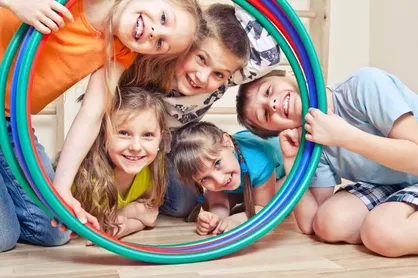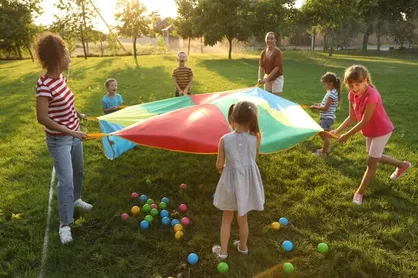Fostering Healthy Minds in Children at Church
If I asked you to define a “healthy mind,” what would you say?
Maybe you would give an example of someone who makes “good decisions” and seems to have it all together. Or maybe you would say it is someone who always gives a smile and exudes the love of Jesus when they walk into the room.
While these can be true, many people can be and actually are struggling under the surface.
A huge part of promoting healthy minds is being aware that “healthy” isn’t always something you can see, like a positive behavior or a friendly smile.
So, how are we supposed to help something we can’t see? How are we supposed to help children with things they may be struggling with under the surface?! Let me tell you, it’s not quite as ludicrous as it may sound.
There are many things adults and leaders can do to promote a healthy mindset in children, even without “seeing.” After all, on a spiritual level, that is our foundation — by faith we believe and act, often without seeing and knowing all the answers.
What Can I Do?
In this blog series on Fostering Healthy Minds in Children at Church, we’ll provide strategies you can use to promote a healthy mindset in children to whom you minister.
Topics we’ll cover include:
- modeling positive behaviors
- giving children opportunities to make decisions
- establishing positive expectations
- creating a sense of belonging
- promoting resilience
- ensuring a safe and healthy environment and tone
- encouraging children to help others
- using and teaching active listening
- incorporating and encouraging physical activity and movement
- asking for children’s input and putting it to use as appropriate
- modeling and discussing healthy coping strategies
- teaching and practicing conflict resolution
That’s a lot! I know it may seem like a tall task to be mindful of all of this while also teaching. I know, I’ve been there! But we’re going to walk through one topic at a time.
Why Is this Worth the Effort?
Why is it important for us to build our knowledge and skills in fostering healthy minds in children at church?
Because children are like sponges. They soak up and learn from every interaction they have.
The more often children have developmentally appropriate experiences that foster and support their mental well-being, the better their foundation for continued growth will be in years to come.
Remember, you may be the only place where some kids will receive this level of acceptance, love, and understanding. For other kids, you may be supplementing the acceptance, love, and understanding they receive in other environments. In either case, what better way to show Jesus than that?
Thank you for taking the time to learn about how to support children’s mental health while engaging them in ministry!
Blogs in this Series
Teaching Children to Resolve Conflict in a Healthy Way
This blog is part of a series on Fostering Healthy Minds in Children at Church that provides strategies children’s leaders can use to foster healthy minds in children to whom they minister. And, hey,
Modeling and Discussing Coping Skills with Children at Church
Modeling and discussing coping skills with children is a vital part of fostering healthy minds in them. Coping skills are methods a person uses to manage stressful situations or deal with strong emoti
Helping Children Learn How to Give and Receive Constructive Feedback
This blog is part of a series on Fostering Healthy Minds in Children at Church that provides strategies children’s leaders can use to foster healthy minds in children to whom they minister. And, hey,
Encourage Physical Activity and Movement with Children
This blog is part of a series on Fostering Healthy Minds in Children at Church that provides strategies children’s leaders can use to foster healthy minds in children to whom they minister. And, hey,
Using and Teaching Active Listening in Children’s Groups
This blog is part of a series on Fostering Healthy Minds in Children at Church that provides strategies children’s leaders can use to foster healthy minds in children to whom they minister. And, hey,
Ways to Create a Physically and Emotionally Safe Learning Environment for Children at Church
When children don’t feel safe in an educational setting, their emotional and mental energy is spent on trying to stay safe instead of on learning. Here are ways you can create a physically and emotion
How to Promote Resilience in Children
This blog is part of a series on Fostering Healthy Minds in Children at Church that provides strategies children’s leaders can use to foster healthy minds in children to whom they minister. And, hey,
Building Connection and Belonging in Children’s Missions Groups
This blog is part of a series on Fostering Healthy Minds in Children at Church that provides strategies children’s leaders can use to foster healthy minds in children to whom they minister. And, hey,
Establishing Positive and Clear Expectations for Children at Church
Establishing positive and clear expectations for children is huge in building compliance, self-esteem, and consistency. But creating and maintaining an environment of cooperation doesn’t happen overni
The Why and How of Giving Kids Choices in the Classroom
Giving kids choices helps establish independence, allows them to practice making decisions, fosters a sense of accomplishment, and allows them to feel respected without giving up your authority.
5 Ways to Model Positive Behaviors for Children at Church
While we are always striving to put our best foot forward when teaching and discipling, we need to be aware of the full impact our words and actions have on children. As children watch our actions and
Creating Safe Spaces for Children at Church
This blog is part of a series on Fostering Healthy Minds in Children at Church that provides strategies children’s leaders can use to foster healthy minds in children to whom they minister. And, hey,












